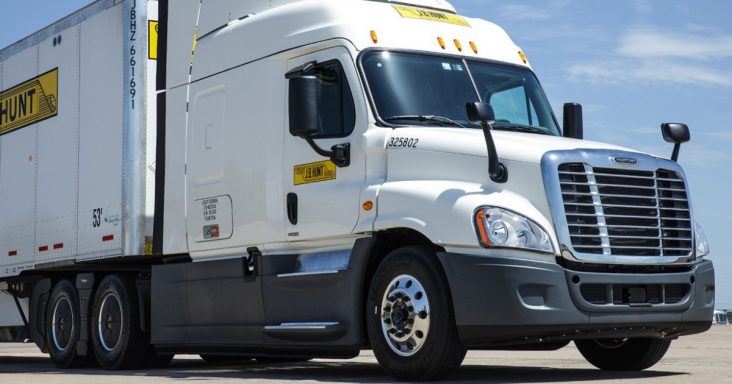J.B. Hunt’s 2018 guidance shows conservatism in intermodal, dedicated contract services
by January 30, 2018 3:01 pm 923 views

J.B. Hunt Transport Services delayed the release of its 2018 guidance by almost three months to complete the year and “dig a little deeper,” but guidance the Lowell-based carrier released is expected to be interpreted as neutral or slightly negative compared to analysts’ expectations, transportation analysts said.
On Nov. 8, John Roberts, president and CEO for J.B. Hunt, said the company had changed its planning cycle as it historically released its guidance for the following year by that time.
“That work is still underway,” Roberts said. “That gives us a chance to finish the year and dig a little deeper.”
On Friday (Jan. 26), J.B. Hunt released its 2018 guidance, showing its intermodal and dedicated contract services segments, which account for the majority of the carrier’s revenue and operating income, would grow at a level that’s slightly less than analysts expected, according to Brad Delco and Justin Long, transportation analysts for Little Rock-based Stephens Inc. Also, the carrier expects its brokerage and trucking divisions to grow as expected or slightly better than analysts expected. In a research brief Monday (Jan. 29), Delco and Long discussed the carrier’s 2018 guidance and noted the carrier didn’t offer any commentary, operating metric expectations or margins projections.
J.B. Hunt didn’t provide a number for projected earnings before interest and taxes (EBIT).
“It is hard to have a definitive view on the ‘earnings expectations’ as (J.B. Hunt’s) EBIT is rather vague at ‘greater than revenue growth,’” Delco and Long said.
Delco and Long expected EBIT to increase 20.4% in 2018. J.B. Hunt expects revenue to rise between 11% and 15% in 2018, and Delco and Long didn’t change their expectations as a result of the guidance. They expect the carrier’s revenue to increase 13.6%.
The carrier expects a 25% tax rate for 2018 and interest expense between $32 million and $35 million. The company looks to increase capital expenditures 24% to $630 million in 2018, with $400 million for replacement and $230 million for growth. In the guidance, the carrier broke down the expenses by segment.
Half or $200 million of the replacement expenses will go to dedicated contract services, and nearly 25% or $96 million will be allocated to intermodal. Of the remainder, $54 million will go to trucking, $48 million for enterprise technology and $2 million to facilities.
For growth, nearly half or $120 million will go to dedicated contract services, while intermodal will receive $69 million. The company will invest $37 million into facilities and $4 million as other growth expenses.
Delco and Long also broke down their analysis by segment, based on the carrier’s guidance and noted some conservative guidance for the intermodal and dedicated contract services segments.
• INTERMODAL
The carrier expects revenue to rise between 7.5% and 11% to $4.39 billion and $4.53 billion. The median would be revenue of $4.46 billion or $100 million less than analysts expected at $4.56 billion.
“Our initial thought here is that there could be some form of conservatism baked into (J.B. Hunt’s) numbers due to fuel being a large tailwind in addition to the positive rate momentum in (truckload) and intermodal markets, in our opinion,” according to Delco and Long. “We believe bears will conclude that fuel is a +2% tailwind in 2018, with price at least a +4% tailwind, which implies volume growth of +2% to +5% which will likely be thought of as conservative.”
• DEDICATED CONTRACT SERVICES
J.B. Hunt expects revenue to increase between 10.5% and 16% to $1.89 billion and $1.99 billion in 2018. The median would be revenue of $1.95 billion, or $20 million less than analysts expected at $1.97 billion.
“Along with the (intermodal) expectations, we also believe there could be some form of conservatism here as it’s hard to predict the outcome of large dedicated contract wins,” according to Delco and Long. “That said, we believe the demand for dedicated capacity remains robust and believe (J.B. Hunt) is likely to be a big beneficiary of the dynamic in the current market environment.”
• BROKERAGE
The carrier expected revenue to rise between 26% and 35% to $1.29 billion and $1.38 billion. The median would be revenue of $1.34 billion, or $80 million more than analysts expected at $1.26 billion. Delco and Long were encouraged by the growth in the segment, but it’s also the company’s lowest margin business. And the added revenue isn’t expected to “drive meaningful upside” to Delco’s and Long’s earnings estimates.
• TRUCKING
Revenue is expected to increase between 3% and 7% to $389.3 million and $404.5 million, according to the carrier’s 2018 guidance. The median would be revenue of $396.9 million, which is flat with analysts’ expectations of $399 million. As the segment becomes a smaller part of the carrier’s business, it’s not expected to have an impact on estimates “in a material way,” according to Delco and Long.
Overall, the analysts expect the company will benefit as a result of existing freight demand, a tight driver market, increased spot rates and driver wage hikes. The company’s “dominant position” in intermodal will help to lead volume and earnings growth in the future. Delco and Long expect its stock price to be $140 in 12 months and maintain a buy rating for it.
Shares of J.B. Hunt (NASDAQ: JBHT) closed at $121.76, down $3.27 or 2.62% on Monday. In the past 52-weeks, the stock has ranged between $126.49 and $83.35.
